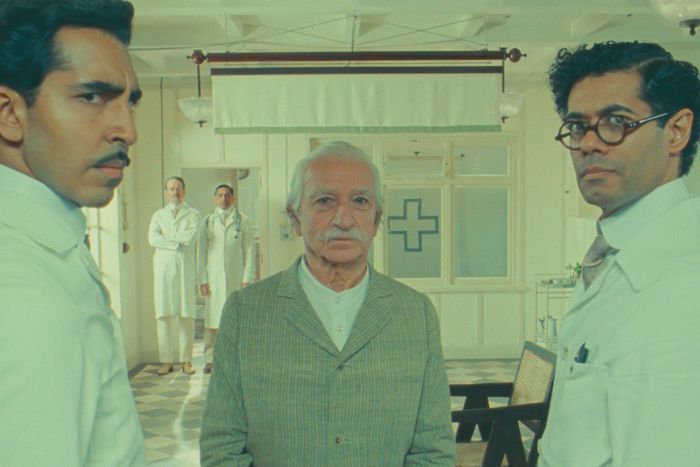
This review was originally published earlier this month out of the Venice Film Festival. We are recirculating it now, timed to The Wonderful World of Henry Sugar’s streaming debut on Netflix.
It feels a little odd to assess Wes Anderson’s 39-minute short The Wonderful Story of Henry Sugar, given that it’s ultimately supposed to work as part of an omnibus of Roald Dahl adaptations by the director presented via Netflix. Those who’ve seen the whole series of shorts tell me that the films, when viewed together, have a kind of shape and trajectory that will be missing when seen as standalone efforts. On the other hand, this particular short has enough in it that at times it feels like a feature in miniature. Indeed, that might be part of the joke, as characters here often speaktheirlinesreallyfast, as if they’re tryingtofittwohoursworthofmaterialinto39minutes.
This accelerated tempo of the film is the source of some of its charm, but it also presents a spiritual context for a story about the transcendent power of focus. The film opens with Roald Dahl himself, played by Ralph Fiennes with admirable surliness, sitting in his cozy little writing hut, surrounded by pencils, cigarettes, coffee, chocolates, and eraser residue. (“So many bits of rubber.”) The author then presents us with the tale of Henry Sugar (Benedict Cumberbatch), a wealthy, 41-year-old man living in a hedonistic cocoon of privilege alongside other rich men. (As Dahl puts it: “They are not particularly bad men. But they are not good men either. They are of no real importance. They are simply part of the decoration.”) One day, trapped indoors by the rain, Henry finds in a library full of books he’ll never read a slim volume which relates the experiences of one Dr. Chatterjee (Dev Patel), who in turn recounts the story of a man named Imdad Khan (Ben Kingsley), a circus performer who could see without using his eyes.
Exploring further, Dr. Chatterjee learns that Imdad Khan learned this method by studying with a yogi who taught him to focus his mind on one thing at a time, eventually gaining the ability to see through objects. Enthused at the gambling possibilities of such an ability, the cynical Henry devotes himself to learning this method of concentrating the mind. (His first task is to imagine the face of the person he loves most — himself.) But gaining this kind of knowledge and ability ultimately transforms him on a deeper level, so that the prospect of making buckets of money gambling eventually ceases to give him much satisfaction.
Replicating Dahl’s original, the story is presented in a nesting doll structure, with each character’s story opening onto another’s. Alongside this, the movie’s hectic (albeit very precise) swirl of dialogue creates a background against which the idea of slowing down and directing all your attention towards one thing feels like a genuine rebuke of the world. It’s a simple and obvious enough conceit, but Anderson and his cast have such fun with it that they render it fresh and original. Everything in the film feels pointedly, almost aggressively constructed, even more so than the average Wes Anderson picture, with the short format giving him an excuse to indulge even further in theatrical motifs: Walls slide away to reveal new locations; one step moves us from one scene to another; clocks advance at super-speed; days, years fly by in a sentence; actors double up on roles; simple, transparent effects are presented as sources of wonderment. The result is delightful, but it also suggests a universe that requires our own imagination to be fully realized — which is, of course, the whole point of the story.
In some ways, this is a typically Andersonian tale of how precociousness can be a dead end, that imagination once unleashed can upend reality. Many of his best films are about the limits of knowledge. But in Henry Sugar, hitting those limits allows the protagonist to forge a new path, lending the film a quaint, almost naïve optimism. Will this sweetness and light continue throughout his forthcoming Dahl shorts, or will Anderson complicate the matter further? That remains to be seen.
More From Venice
- Agnieszka Holland’s Green Border Is an Urgent Warning
- Ava DuVernay’s Origin Devastates Its Audience
- If Glen Powell’s Not Already a Star, This Movie Will Make Him One


